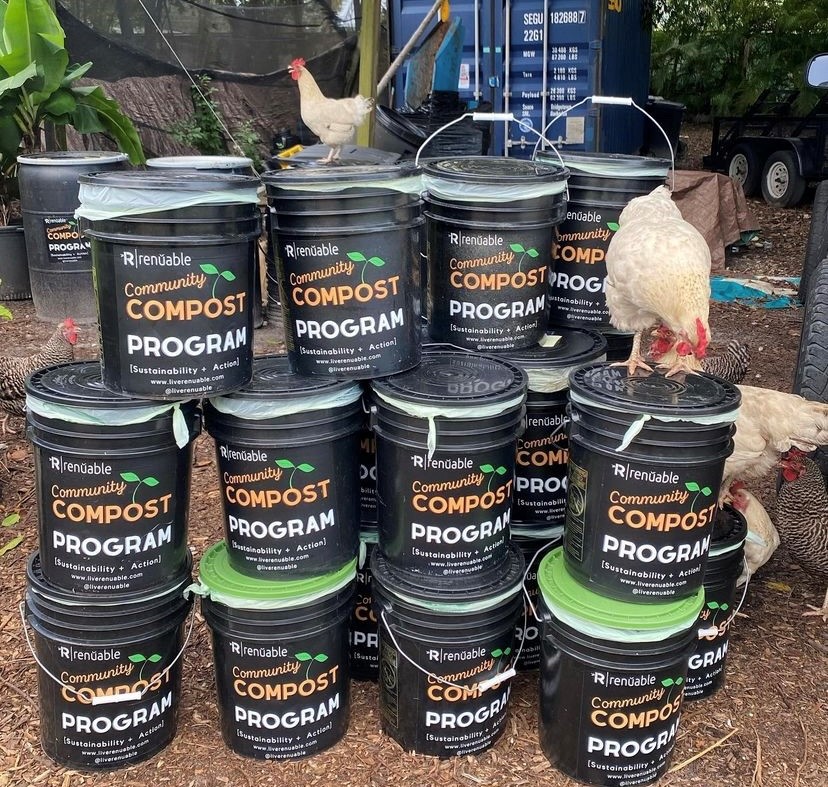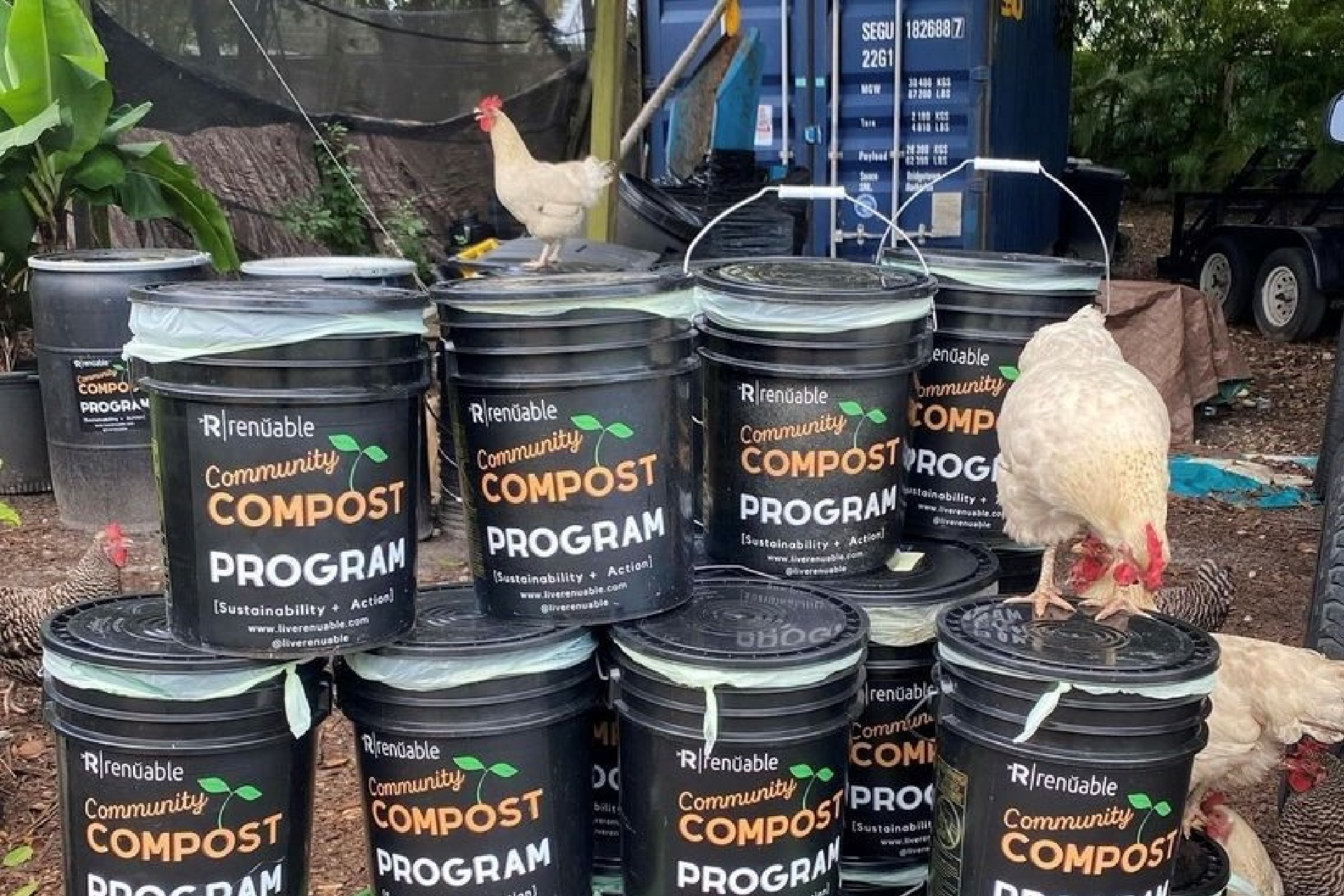Green Success Stories puts Xavier DeRoos of Renüable in the Green Spotlight. Renüable works toward increasing the use of composting as both a local and large-scale solution. We discussed the importance of composting in preventing global warming caused by methane from organic waste in dumps. We likewise pointed to the importance of healthy soil in providing us with clean food, water, and air, and how composting improves soil and protects the watershed.

Give us some background – Tell us a bit about what’s on your mind regarding sustainability.
How often do we think about the soil beneath our feet? We humans rely on the soil to provide us with a stable supply of food, clean water, and clean air. Soils have lived histories and stories to tell. They are alive. If we do not listen to the stories of the soil, we as humans might destroy the soil which supports countless lives. Whether we know it or not, soils are the silent partner that sustains us. In the years and decades to come, what will our lasting legacy be in the story the soil tells? One-third of the world’s land has been lost to soil erosion and continues to be lost at an alarming rate. Amending soil with compost improves soil quality and structure, increases water retention, reduces chemical needs, and cuts pollution. Improving soil and protecting watersheds are two key drivers of why we need more composting.
Tell us a bit about the product or solution you offer.
Renüable was founded in 2021 with the mission to divert organics from our community’s restaurants, businesses and homes from ending up trapped in landfills. Renüable operations consist of East and West teams that operate in the greater Tampa/St. Petersburg area as well the Miami/Broward region. We have successfully diverted over 2.5 million pounds of compostable materials from landfill since 2021.
Share a green success story with us – how have you helped customers or other businesses in the fight against climate change?
In the U.S. alone food is the single most common material sent to landfills. So, what happens when that food is sent to landfills and sits there? It starts to go through a condition called anaerobic decomposition which occurs in landfills when food decomposes, aka rots in the absence and lack of oxygen. This then creates the perfect environment for methane producing bacteria. For example – A single head of lettuce, apple, and baby carrot can take up to 25 years to decompose in landfill giving off harmful methane gas the whole time.
Why is methane so bad? Methane is a greenhouse gas with global warming potential approximately 85 times higher than carbon dioxide over a 20-year time period. To put it another way – methane does its damage quickly, while CO2 traps a smaller amount of heat consistently, decade after decade.
Some recent headlines: A new report that was just published (March 2024) “A potent planet-warming gas is seeping out of US landfills at rates higher than previously thought, scientists say. Scientists flew over more than 200 landfills across 18 states from, in what they say is the largest measurement-based survey of America’s landfills. Their results revealed average methane emissions were much higher than those officially reported.”
“The problem could be much worse than previously thought, according to a new study measuring methane pollution at hundreds of landfills across the country.”
“We have to remember that methane is an invisible, odorless gas—which is produced by various sources, the biggest of which are oil and gas and then agriculture. However, the study also found landfill methane emissions were generally much more persistent than those from oil and gas production, with 60% lasting for multiple months or even years.”
I believe the statistic I cited earlier is indeed a really nice green success story – We have successfully diverted over 2.5 million pounds of compostable materials from landfill since 2021.
What would you do with $1 billion dollars?
As an organization we would love to expand our project to work with the municipalities all over Florida, investing, partnering with agricultural projects. We can’t just see composting on a small scale– it needs to not only be on a community level but on a farming level. We need to be spreading compost on agricultural land. California already does this, through its Healthy Soils Incentives Program, and a handful of other states have put similar efforts in place that will lead to compost being included more often in the list of practices that farmers are being paid to adopt. Research has shown that laying compost on agricultural fields is key to accelerating carbon sequestration in the soil. Some estimates suggest that adding compost to an acre of land can sequester enough carbon to offset 75 percent of a car’s annual emissions.
What do you envision your industry looking like in ten years?
Composting is mandatory in every part of the world!
What would you like readers to take away from this article?
Plastic and recycling gets so much attention and composting is far underappreciated. It would be great if readers would start looking at composting as the acronym – CMP – Change Mitigation Potential – the ability to reduce greenhouse gases and understand that cutting methane emissions NOW can rapidly reduce the rate of warming in the near-term. The United Nations states that immediate reductions in methane emissions are the best, swiftest chance the planet has at slowing climate change.
How should readers get in touch with you and/or your organization?
- IG – @liverenuable
- Website – https://liverenuable.com
- Email – Hello@liverenuable.com
Kudos
Many thanks to Xavier DeRoos and Renüable. Green Success Stories is happy to support and highlight your efforts! We invite you the reader to do the same.
Support Green Success Stories
We invite you the reader to support Green Success Stories efforts as well:
- Consider our writing and promotional services
- Donate $100 to Green Success Stories via Paypal
- Refer us to others who could use our writing and promotional services
- Suggest other leaders to feature in the Green Spotlight
- Spread the word about Green Success Stories
Thanks for your support.
